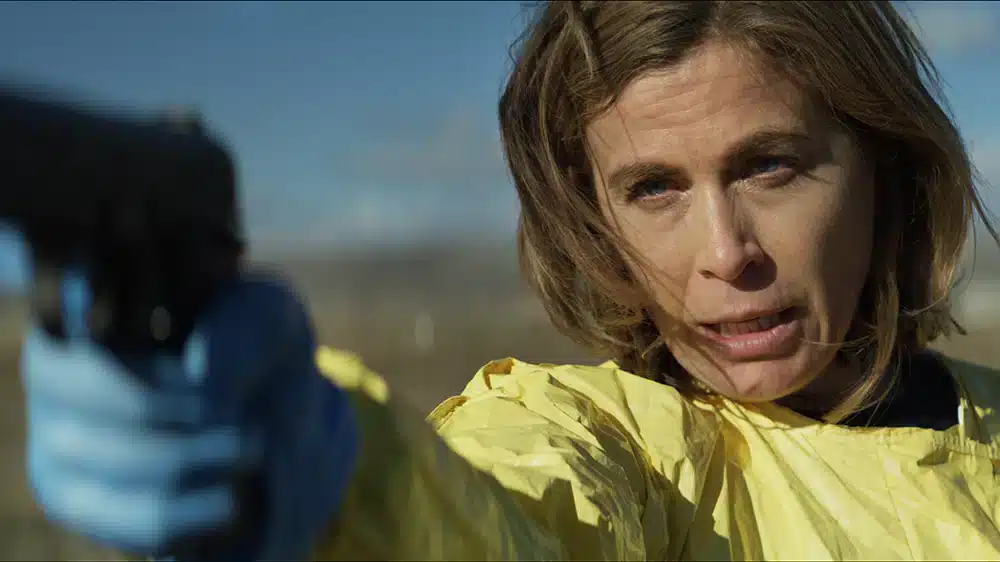
New Life (2023) opens in medias res: a bloodied, panicked young woman makes her way along a street, clearly fearful of being seen or stopped. She heads home, cleans herself up – but her safety and her memories of this place soon get left behind, and she’s moving again. It’s immediately clear that an old way of life has been extinguished; that persists here as a theme, as the girl, Jess (Hayley Erin) has to head North, so far as she sees it – and as quickly as possible. Why? The film takes its time answering that question – it’s one of its key strengths – but clearly Jess is a person of some importance, whatever she may or may not have done.
We next meet a special operative called Elsa (Sonya Walger), a woman poised somewhere between motivational quotes (displayed in her home) and meds (stored and accessible at home). She receives a visitor, colleague and boss Raymond (Tony Amendola), who hands her an important new brief: tracking Jess down, finding her before she crosses the Canadian border. Clearly these people are intent on locating Jess with a team dedicated to doing it, but Elsa is a big hitter which escalates things further still; her requested involvement says as much.
But, for her, there’s more: she is newly dealing with a medical condition which will, at some point, and soon, derail this big-hitting career. It’s addressed early in the film during a very powerful scene: outside of her office hours, and just as she’s started the hunt for Jess, she has a meeting with someone offering advice on how to live with the condition of ALS. It’s a type of motor neurone disease which, in common with all variants of the condition, is progressive. It will render her relationship with her body into something new, something unsolicited; this affects everything about the challenging job she has just taken. She has limited time to find the girl, and limited time left.
New Life parcels out its story very carefully and deliberately; because it takes this time to unveil the motivation behind the pursuit, keeping us in the dark alongside its key players, somehow this absence of knowledge turns readily into dread, even very early on; if so many resources are being put into finding this young woman, and if she is that hellbent on escape, then something significant is pressing at the edges here. The ways in which Jess’s flight impacts upon other people escalates that dread, too. Even moments of calm feel ominous, as well as being rich, touching, well-observed moments, all brought to life by a sensitive, light-touch script. It’s never an overwritten film; it understands pace, silence, absence and exposition perfectly and keeps them in balance. It also sets up opposing worlds, on- and off-grid, with the latter, glimpsed via Jess, incredibly beautiful. One of our characters is hyper-connected; one has disappeared herself, or attempted it.
And these worlds have to collide; we live in a world – as reflected in the film – where everyone can be found, if only enough people are looking. The harm and destruction which set in as a result are bleak and upsetting, even when treated obliquely; oblique approaches allow certain ideas to land slowly. Elsewhere, there’s shock and brutality which edges oh-so close to the fantastical, but never fully settles there. Less is more: the film only needs to show its hand a couple of times for the truly devastating central ideas to take hold.
At the heart of all this, two women are being brought together, each with their own agonising backstories. The film asks further questions, too: it riffs on ideas of high-stakes health, wellness and illness, and by now, at this point in history, we’re more than a little primed for this kind of subject matter. Something else which really stands out for this reviewer is around the theme of ‘good people’. In many respects, New Life is at its harshest and cruellest on this subject; the escalating situation at its heart draws in more and more of these people. But what makes a good person? What does a good person do? And what happens to them as a result? The moral ties which bind people together become fragmented. As this happens, we develop a range of feelings towards our main protagonists: there’s rising pity and anger (with a few lines which continue to resonate), there’s plausible, pitiable humanity, and there’s deep sadness.
Both vast in scale and yet always intimate, New Life is a whip-smart, challenging film with something purposeful and significant on every beat. That this is a directorial debut by a former journalist, John Rosman, makes it all the more intriguing and unusual. It’s superb.
New Life (2023) featured at the Fantasia International Film Festival (and will also receive its European premiere at FrightFest, UK.)
